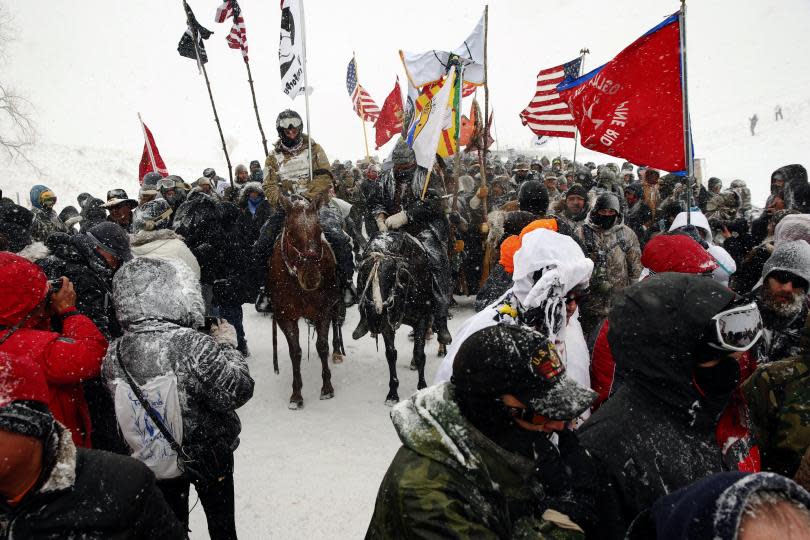Trump Considering Privatizing Oil And Gas On Reservations
Opponents of the Dakota Access Pipeline route in North Dakota may have won a victory this week, but Native Americans may have an even bigger fight on their hands if advisors to President-elect Donald Trump get their way.
Though American Indian reservations comprise just 2 percent of the U.S. land mass, they may contain as much as 20 percent of the nation’s oil, gas and coal reserves worth an estimated $1.5 trillion.
Reuters reported Monday some of Trump’s advisers are suggesting those energy reserves should be freed from federal bureaucracy and put into private hands.
Tribal lands, some 56 million acres, are owned by the federal government not the tribes although members are free to exploit the resources and keep the profits, albeit under federal regulation. The reservations are ruled by tribal councils and treated as sovereign territory.
Protesters successfully blocked the Dakota Access Pipeline from being constructed beneath Lake Oahe at the Standing Rock Sioux reservation. The Army Corps of Engineers refused to issue an easement to allow the construction under the Missouri dam reservoir. Native Americans and activists had argued the pipeline would damage sacred lands and might contaminate the tribe’s water source.
Energy Transfer Partners, which is building the pipeline, said in a joint statement with its partner Sunoco Logistics Partners, it has no intention of exploring an alternate route. The 1,172-mile pipeline except for the 1 mile that was supposed to go beneath Lake Oahe. Protesters told Reuters they expect the Trump administration to try to reverse the corps’ decision.

Opponents of the Dakota Access Pipeline in North Dakota may have won a round but advisers to President-elect Donald Trump want to privatize oil and gas production on Native American lands. Protesters continued to demonstrate Dec. 5, 2016, near Backwater Bridge just outside the Oceti Sakowin camp at the Standing Rock Sioux reservation. Photo: Lucas Jackson/Reuters
Though some tribal leaders favor the idea of privatizing tribal land resources, others charge it would violate tribal self-determination and culture.
"Our spiritual leaders are opposed to the privatization of our lands, which means the commoditization of the nature, water, air we hold sacred," Tom Goldtooth, a member of both the Navajo and the Dakota tribes, told Reuters. "Privatization has been the goal since colonization – to strip Native Nations of their sovereignty."
A 2015 Government Accountability Office report found widespread mismanagement by the Bureau of Indian Affairs, jeopardizing projects by taking as long as eight years to review documents. As a result, the report found, “Indian energy resources hold significant potential for development but remain largely undeveloped.
"We should take tribal land away from public treatment," Cherokee tribe member Rep. Markwayne Mullin, R-Okla., who co-chairs Trump’s Native American Affairs Coalition, told Reuters. "As long as we can do it without unintended consequences, I think we will have broad support around Indian country."
Rep. Benjamin Nageak, D-Alaska, who was born in the Arctic National Wildlife Refuge, said in a 2015 video it’s wrong to make it so difficult for tribes to develop resources on their reservations, some of the poorest areas in the country.
The reservation system grew out of the treaties of 1778 and 1871 that ended wars between Native Americans and European settlers.
"The time it takes to go from lease to production is three times longer on trust lands than on private land," Mark Fox, chairman of the Three Affiliated Tribes in Forth Berthold, North Dakota, told Reuters.
"If privatizing has some kind of a meaning that rights are given to private entities over tribal land, then that is worrying. But if it has to do with undoing federal burdens that can occur, there might be some justification."
Trump said during the campaign he wanted to increase oil and gas production, as well as eliminate much of the nation's regulatory regime.
Related Articles


